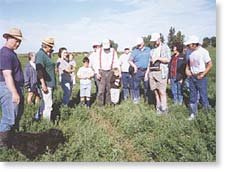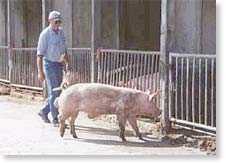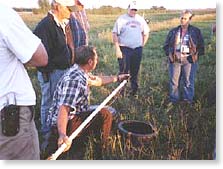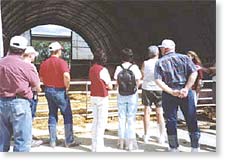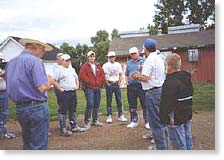|
Exploring Sustainable Hog Production Methods
Missouri has historically been a primary state for hog production, with hogs playing a significant role in the diversified crop and livestock operations of our state’s family farmers. Farming operations have tended to be smaller and more diverse than in many neighboring states. Hog sales have been a vital source of cash income during times of the year when other sources of income were not available -- the “mortgage lifter,” as they were sometimes called. Beginning in the late 1980s, and accelerating rapidly throughout the 1990s, hog production throughout the United States began to undergo major structural and economic changes. Giant meatpackers and corporate factory farms began to get into the business of producing hogs. These changes were fueled by several factors -- cheap grain, huge amounts of guaranteed capital available to factory farms, lack of environmental accountability by corporate livestock factories and a lack of enforcement of antitrust laws to keep the marketplace open and fair. The effects of these changes have been and continue to be devastating: due to vertical integration and corporate concentration in the hog industry, more than 70% of Missouri hog farmers have been driven out of business since 1994 (10,500 in 1994 to 3,100 today). In the last sixteen years, the hog farmer’s share of the retail dollar has plummeted from 46 cents in 1986 to 30 cents today. At the same time, consumer prices have increased by more than 40%. In short, somebody has been making a killing in hogs in the last 20 years, but it certainly hasn’t been family farmers. To challenge this corporate takeover of the livestock industry, MRCC began to organize opposition among our 5,500 members on numerous fronts. We challenged Premium Standard Farms, the first corporate livestock factories in Missouri. We called for environmental standards at the state and federal level that would hold corporations accountable for their pollution while allowing family farmers to continue to operate efficiently as they had in the past. We joined with other Midwestern farm groups to form the Campaign for Family Farms and the Environment (CFFE), an allied front to challenge the corporate takeover of the hog industry. CFFE groups include the Missouri Rural Crisis Center, Land Stewardship Project from Minnesota, Iowa Citizens for Community Improvement and the Illinois Stewardship Alliance. We organized the successful petition drive and vote to terminate the mandatory pork checkoff, and the legal challenges to uphold our historic victory. We organized to pass the ban on packer ownership of livestock twice in the U. S. Senate during the 2001-2002 farm bill debate, and continue to work to pass the packer ban. On the marketing end, MRCC created an economic development project, Patchwork Family Farms, to directly link Missouri hog farmers with consumers in Mid-Missouri. Patchwork producers raise their hogs using sustainable and humane growing standards: growth hormones or synthetic growth promoters are prohibited, no continuous feeding of antibiotics is allowed, animals must receive adequate amounts of sunshine, fresh air and quality feed necessary to maintain good health and animals are raised in a socially responsible manner, using environmental stewardship and sustainable growing practices. Through this cooperative production and marketing of premium quality pork, Patchwork producers receive a fair price for what they produce, which is significant because the current marketplace is neither fair nor competitive. While Patchwork has focused on the marketing and product development end over the last several years, we’ve become more and more interested in providing Missouri farmers with information on sustainable hog production techniques that can help Patchwork producers to become more profitable and sustainable. To learn more, MRCC joined with long-time ally Land Stewardship Project (LSP) in Minnesota. MRCC and LSP have a long and successful relationship of working together. Both organizations are founding members of the Campaign for Family Farms and the Environment, and have worked together for almost a decade on innovative policies and programs that will benefit farmers and the environment. LSP has successfully created a university-based research program for sustainable hog production by working through the Minnesota state legislature and University Extension. LSP members have utilized state and federal grants programs to make improvements in their operations. After talking about how we could best learn from one another, 10 Patchwork Family Farms producers and staff traveled to Minnesota in August of 2002 to visit with LSP for a producer exchange. We organized the trip so that farmers could have one-on-one conversations on issues related to sustainable production techniques, family farmer marketing efforts and creating fair and competitive markets. It was to be a true farmer-to-farmer exchange, full of good food and good conversation on the western Minnesota prairie. About the Land Stewardship Project The Land Stewardship Project (LSP) is a private, nonprofit organization founded in 1982 to foster an ethic of stewardship for farmland, to promote sustainable agriculture and to develop sustainable communities. Since its founding in 1982, the Land Stewardship Project (LSP) has worked steadfastly for environmental and social justice in rural America. LSP began by educating rural and urban people on the ethics of farmland stewardship through cultural programs and by creating a farmer-to-farmer network to help farmers move to more sustainable farming methods. In response to urban sprawl, they initiated discussions on smart growth and farmland preservation options. LSP has helped dozens of communities organize to stop factory farms and linked sustainable livestock producers to potential urban customers. Working in the Sustainable Agriculture Coalition, LSP backed federal policy promoting farming alternatives that are good for the land and good for farmers. They have introduced hundreds to Whole Farm Planning and Monitoring. And LSP helped Community Supported Agriculture farms get established throughout the region. LSP regularly supports research of farming practices that improve the profitability, environmental sustainability and quality of life of family farmers. Reflections As we drove back from Minnesota, we discussed what we had learned on the trip. One striking difference between the Missouri and Minnesota farm situations was the clear differences in diversification. In Missouri, most producers raise a wide array of crops and livestock. Almost everyone has some pasture and woodlot as well. In western Minnesota, there is mostly corn, beans and an occasional field of sugar beets. There’s very little pasture or cattle, and the only trees are around the farmhouses. It’s row-crop country, pure and simple. That’s why the Minnesota farmers kept talking about how everyone needed to diversify to survive lower corn and soybean prices. For Missouri farmers, the question is how to build on the diversity that already exists. Clearly, this diversity has helped us to maintain a strong family farm base in our state, the number two ranking state in number of farm operations. We were also impressed by the way the LSP members had worked together to create the Swine Research Center and form a network of sustainable hog producers to learn from each other’s production systems. By focusing on grassroots organizing and building farmerfriendly coalitions, LSP has been able to accomplish a great deal. Maybe we can learn some important lessons from their example. Jonathon Stroebel, a young farmer from Tipton, MO told us that he “was impressed by how the farmers in Minnesota were able to adapt these sustainable techniques into their existing buildings and other resources; this was what made these techniques even more economical.” Carl Weihardt, a Patchwork producer from Howard County, MO was “...really impressed that, in a time where all the big companies are trying to take over and weed out the little producers, farmers were able to put their heads together and organize and still have their place in production agriculture.” Carl talked about his role as an MRCC member in the fight to preserve family farms. “I’m really glad that there’s a group of farmers banding together; I think that’s really important for the future instead of encouraging our children to take off-farm jobs and letting the big industry take over. It feels good to get involved and stand up for what I believe is a worthwhile effort that we need in this country.” Brenda Dougherty was impressed with the individual marketing efforts of the farmers. “They had created many different strategies for getting their products straight to the consumers; this helped them maximize the profits from their products.” Joyce Perry, a diversified row crop and livestock farmer from north-west Missouri, admired the pasture farrowing and hoop houses at Jim VanDerPol’s farm. “Those hogs were different than confinement hogs, they seemed to be stress-free hogs and that is what I believe impressed me the most. I think (these techniques) are something that we can use very efficiently in Missouri.” Joyce was inspired by the fact that “The families in Minnesota are changing their operations to be able to find a way that they can involve the next generations. At every farm that we went to the sons and daughters were a part of the operation.” |
||||||||||||||||||||||
| Published in In Motion Magazine, March 18, 2003 |
||||||||||||||||||||||
If you have any thoughts on this or would like to contribute to an ongoing discussion in the  What is New? || Affirmative Action || Art Changes || Autonomy: Chiapas - California || Community Images || Education Rights || E-mail, Opinions and Discussion || En español || Essays from Ireland || Global Eyes || Healthcare || Human Rights/Civil Rights || Piri Thomas || Photo of the Week || QA: Interviews || Region || Rural America || Search || Donate || To be notified of new articles || Survey || In Motion Magazine's Store || In Motion Magazine Staff || In Unity Book of Photos || Links Around The World || OneWorld / US || NPC Productions Copyright © 1995-2011 NPC Productions as a compilation. All Rights Reserved. |


